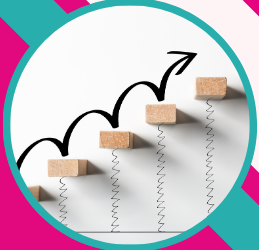Kantar research has found that brands that are meaningfully different grow three times faster than brands that aren’t. And that’s not just B2C mega brands. That’s true for B2B SMEs as well.
Brand differentiation is a massive competitive advantage that’s often misunderstood and overlooked. We caught up with Tim Parrack, Regional Marketing Director for the South East and Nigel Bromley, Regional Marketing Director for the West Mids, to discuss why brand differentiation is so important and how you can go about making it work for your business.
What is brand differentiation and why does it matter?
"The author Rory Sutherland (TED speaker and Vice Chair of Ogilvy & Mather Group) has a quote,” Nigel says. “Having a great brand means you get to play the game of capitalism on easy mode. Because people are drawn to you and more likely to trust you.”
But what do we mean by a ‘great brand’? Ask 20 marketers that question and you’ll likely get 20 different answers, but in general, great brands tend to:
- Have unique or distinctive ‘brand assets’ that make them easy to remember
- Be rooted in fundamental truths about the product and the customer
- Clearly communicate their value proposition to the customer in a way that resonates with them
“Your brand is a driver of choice,” Nigel says. “You build a brand so people choose you over others. Or at the very least include you in their consideration set.”
The goal of brand differentiation is to make your brand distinctive, memorable and as relevant to the customer as possible. This will help your message land - and help customers remember you when they enter some kind of buying cycle.
How can you build a meaningfully differentiated brand?
When people talk about brand they often think about visual elements like logos or colour schemes. But these things are actually expressions of a deeper underlying narrative.
“I tend to start with concrete things like unique product features and attributes,” Nigel says. “Then use them to define more abstract things like brand personality, tone of voice and customer-facing strapline. This helps keep things grounded in the reality of the product.”
“As an example, all cars have wheels and engines. You can’t differentiate much there. But maybe this car is great off-road. What does that mean? Well, it means freedom. Perhaps it means the spirit of adventure. That’s what can differentiate a brand like Land Rover from BMW or Mercedes. The key thing is that it starts with the product.”
While there is creativity at play here it’s also important to keep things clear and easy to understand. Especially in B2B markets where marketing can become laden with technical jargon.
“Whatever your message is, it needs to be understood by people on the outside of your business,” Tim adds. “That is the real creative challenge. Encapsulating your unique differentiators in a way that’s compelling and interesting but also crystal clear.”
Business owners can struggle to recognise their differentiators because they’re so close to them. This is why they often need experienced specialists who aren’t as close to the day-to-day to look at things from a fresh perspective.
“A few years ago I worked with a wonderful company that made clinical wipes,” Nigel says. “At that time they were number two in the UK, but the reality was that their product was superior to the market leader.
“Without going into detail, a quirk of their manufacturing process meant that the last wipe would be just as effective as the first, while the market leaders’ were less effective near the bottom of the pack. A chap on the factory floor showed me this on a factory tour. Nobody thought to tell that story before because they’re chemists, not marketers.”
The importance of understanding and emotionally connecting with customers
Finding unique product angles is a good start, but you also need to sense-check them. Just because something sounds great to you, doesn’t mean your customers will agree.
“All of the work you’re doing here needs verification,” Tim says. “It’s all very well doing this work in your own head or on a piece of paper, but you need to take it back to the customer and see what they think. If it doesn't resonate with them, it’s not right.”
Speaking to customers can also help you uncover those unique truths about your own business that you weren’t aware of.
“Business owners often have a very clear view on their market,” Tim says. “But their customers won’t necessarily share that view and it’s a huge mistake to assume they will. Your value proposition is really about them. So much of brand building is about seeing things from the customer’s perspective.”
What are the signs you have a brand differentiation problem?
A lot of the companies that approach us do so because their growth has stalled and they’re not sure why. Often, the answer is a lack of differentiation.
“Growth slows down for these companies because they've done what they can with what they have,” Tim says. “They've succeeded because they've got a good product and they've managed to access a group of people through their network who will buy. But to break out of that network they need to build some kind of brand. Otherwise, you’ll always be relying on short-term tactics, hoping that you cold call at the right time.”
Nigel agrees. “The best way to diagnose a brand problem is to look at your sales. Not hitting targets? How often does the phone ring? How much margin are you making? Are you under price pressure? How loyal are your customers?”
These issues come about because people see you as interchangeable with others. Brand differentiation is how you fix that.
Seize the advantage your competitors are missing
Brand building drives business growth. It makes it cheaper, quicker and easier to generate leads and close them. It also makes existing customers less likely to churn. And yet, most B2B SMEs deprioritise brand in favour of lead generation because the latter is easier to measure and, in theory, promises a more reliable short-term return on investment.
But the research doesn’t lie. And we’ve seen it time and time again in business both big and small. Great brands build great businesses.



